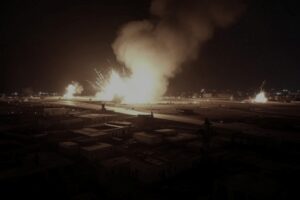
Hezbollah plans to inflict significant physical and psychological damage in the next military conflict with Israel. A senior Hezbollah commander previously warned that the group will bomb Tel Aviv and invade northern Israel in case of war. Such threats should be taken seriously.
Hezbollah’s massive arsenal includes precision-guided missiles that can hit central Israel and other regions. In parallel, the group’s elite Radwan unit has been training to launch raids into Israeli territory. The IDF’s key aim in the next conflict will be to destroy Hezbollah’s elite troops.
Notably, a military clash with Hezbollah could come as part of a wider conflict between Israel and the Iran axis. The IDF estimated that 100 Israelis will be killed and about 1,000 will be wounded in a missile assault to avenge an Israeli strike on Tehran’s nuclear program.
Most of the damage will likely concentrate in northern Israel and the Haifa region, Walla News reported. However, Hezbollah will also aim to target military bases and Israel’s economic nerve center in Tel Aviv.
In addition to conventional military power, Hezbollah may use chemical weapons to disable Israeli soldiers and civilians.
The expert’s warning
Earlier, an Israeli expert warned that Hezbollah will use its sizeable missile arsenal to attack Tel Aviv if a major conflict erupts. The group is unwilling to accept an equation that allows the IDF to bomb vital assets as part of a limited skirmish, veteran researcher Shimon Shapira said.
Hezbollah will treat a confrontation as an all-out war and respond in full force, Shapira wrote in an article published by the Jerusalem Center for Public Affairs.
Hezbollah clearly conveyed this message to Israel during a previous IDF war exercise, the analysis said. The group quietly declared a heightened state of alert during the drill, mobilizing its combat forces including missile units.
This was a signal that Hezbollah will not permit the IDF to bomb strategic targets without retaliating heavily, Shapira wrote. The group is especially sensitive to attacks on key assets such as its precision-missile program.
Overall, Hezbollah’s war plans call for any action necessary to ensure that Israel does not change the rules of the game, the article said. This includes not only a large missile attack on Tel Aviv, but also cross-border raids on communities in northern Israel.
Hezbollah’s war doctrine
Previously, a former IDF general warned that Israel needs a fresh combat doctrine to avoid defeat in the next Lebanon war. Hezbollah’s planners designed a strategy that aims to frustrate Israel and prevent the army from achieving a victory, Maj. Gen. (res.) Gershon Hacohen wrote.
The Lebanese group poses an “unprecedented operational challenge” to the IDF by basing its war plans on three key pillars, Hacohen said.
First, Hezbollah plans to hit Israel’s civilian front and military bases with rocket barrages for long days. The second tactic is a dense defensive posture aimed at producing a heavy casualty toll among IDF strike forces. Thirdly, Hezbollah plans to carry out wide-scale commando operations targeting civilians and IDF posts across the entire border.
The combination of these three efforts could challenge the IDF’s traditional capabilities to the point of “strategic embarrassment,” Hacohen wrote. Even a deep incursion that reaches Beirut won’t necessarily secure an Israeli win, he noted, as besieged Hezbollah forces will likely keep fighting.
Neutralizing Hezbollah fully would require a huge effort, and the group’s rockets will continue to paralyze Israel’s home front, the ex-general wrote. The attacks from Lebanon could be supplemented by missile strikes from Syria and Iraq, he added.
However, Hacohen noted that the IDF General Staff fully grasps the dangers. Ultimately, the key to defeating Hezbollah lies in the IDF’s advanced technologies in intelligence and firepower, the former general concluded.
Another Israeli ex-general, Yaakov Amidror, said that Israel must fully demolish Hezbollah in the next war.


